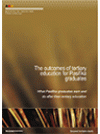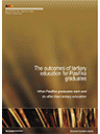This report looks at the earnings and outcomes for young Pasifika and non-Pasifika who complete a qualification in the New Zealand tertiary education system. It replicates the methodology of Moving on up – what young people earn after their tertiary education (Mahoney et al, 2013) to examine differences in incomes and employment rates for different types of qualifications by ethnic group.
Key Results
- The returns to study were generally higher for young Pasifika graduates than for young non-Pasifika graduates. This means that gaining a tertiary qualification is a means of reducing or eliminating disparities in earnings between Pasifika and non-Pasifika.
- Pasifika graduates’ earnings growth was generally a little higher than non-Pasifika graduates. The exception to this was graduates of level 8 and level 9 (masters) qualifications, whose earnings growth was lower than among non-Pasifika graduates.
- There was a negligible difference in earnings between young Pasifika and non-Pasifika graduates in all years after completing qualifications at bachelors level.
- For graduates of qualifications at lower levels, the main difference in destinations was that Pasifika graduates’ employment rates were lower than non-Pasifika graduates’ rates. Further study and benefit receipt rates were correspondingly higher among young Pasifika graduates than among young non-Pasifika graduates.
- By five years after study, Pasifika graduates with qualifications at bachelors level or above were more likely to be in employment than equivalent non-Pasifika graduates. Pasifika graduates were less likely to be overseas, and more likely to be on a benefit, especially after completing qualifications at lower levels.


